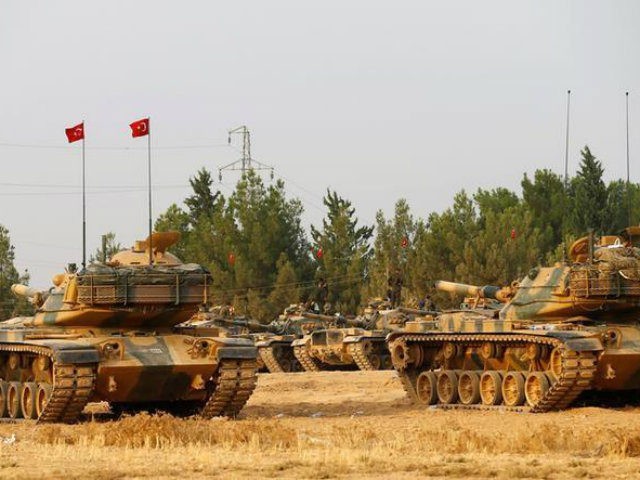U.S. Secretary of Defense Ash Carter is expected to visit Turkey Friday, a day after Turkish President Recep Tayyip Erdogan unleashed a scathing critique of the ongoing efforts by the U.S.-led coalition to push the Islamic State (ISIS/ISIL) out of Iraq, demanding a bigger role for Turkish troops.
On Wednesday, the Erdogan administration claimed Ankara and Washington had reached an agreement to allow Turkey’s participation in the ongoing offensive to retake Mosul from ISIS despite the objections to of the Iraqi government.
“It’s natural that Turkey will be part of developments and meeting about Mosul,” Erdogan’s Defense Minister Fikri Isik was quoted by Hurriyet Daily News as saying.
“It’s not possible to make a decision on the future of Mosul without Turkey,” he added.
Turkey’s Prime Minister Binali Yildirimi did reportedly note on Wednesday that Turkey was not joining the airstrikes against ISIS in Mosul “right now,” but made headlines Tuesday, by claiming that his country had reached an agreement with American commanders to allow Turkish warplanes to join the aerial strikes in Mosul.
“In the event there is a need, our warplanes will participate as part of the coalition. What is important is to be part of it,” Yildirimi told reporters.
The following day, on the eve of Carter’s visit, Erdogan blasted the U.S.-led coalition fight against ISIS in Iraq after the so-called agreement had apparently fallen apart.
Baghdad has repeatedly called on Turkey to withdraw from Iraq, but Ankara has refused, insisting that it will participate in the liberation of Mosul, Iraq’s second largest city and ISIS’ last major stronghold in the country.
“The Obama administration has long sought to control Turkish involvement in the Iraq fight amid fears of a clash with American-aligned Kurdish forces near Mosul, but Mr. Erdogan threatened Wednesday to take unilateral action if Turkey’s interests were threatened by chaos spilling from the battle to reclaim Iraq’s second-largest city,” reports The Washington Times.
“From now on, we will not wait for problems to come knocking on our door, we will not wait until the blade is against our bone and skin, we will not wait for terrorist organizations to come and attack us,” declared Erdogan in a fiery speech from his presidential palace in Ankara.
The Pentagon announced Carter’s visit to Turkey earlier this week.
“Carter is scheduled to meet with Turkish leaders to discuss a range of security challenges in the region, including the latest developments in Iraq and Syria,” reported DoD (Department of Defense) News on Tuesday.
U.S. Army Maj. Gen. Gary J. Volesky, the top commander of the land component of the U.S.-led coalition against ISIS, and commander of the fabled 101st Airborne Division, refused to confirm the Erdogan administration’s claim that it had reached a consensus with the alliance on Turkish fighters involvement in the Mosul operation.
“As far as Turkey, I’m not aware…that they’re on our air tasking order flying here as part of the coalition. I’ll leave that up to [U.S. Central Command] CENTCOM. They’d know that better than I would, but I don’t have any indications of that now,” Gen. Volesky told Pentagon reporters on Wednesday.
CENTCOM is in charge of U.S. military operations in the Middle East and Afghanistan.
On Tuesday, Peter Cook, the press secretary for the Pentagon, stressed:
[Iraqi] Prime Minister [Haider al] Abadi has made clear that forces operating in Turkey, international forces, need to be there at the consent of the Iraqi government. We agree with that position. And we encourage the Iraqi government and the Turkish government, both have ample interest in seeing ISIL defeated, in resolving these issues and we certainly are hopeful that that can be done…
Baghdad is vehemently opposed to Turkey’s presence in Iraq.
Nevertheless, an estimated 500 Turkish troops have been at a base north of Mosul since last December training Sunni and Kurdish fighters.
Erdogan has close ties to Iraqi Kurdistan President Masoud Barzani, which may explain how the troops entered Iraq. Northern Iraq’s Kurdistan Regional Government (KRG) borders Turkey. Mosul is located in northern Iraq’s Nineveh province, right outside of Kurdistan.
“Turkey has historic ties to Mosul that go back centuries, and sees itself as its protector because of the city’s Sunni majority and large ethnic Turkmen community,” suggested Fadi Hakura, a Turkey analyst at Chatham House.

COMMENTS
Please let us know if you're having issues with commenting.